» The 29th Conference of the Parties to the U.N. Framework Convention on Climate Change (UNFCCC COP 29) will be held in Baku, Azerbaijan, from November 11 to November 22, 2024.
This year, at UNFCCC COP 29 in Baku, Azerbaijan, representatives from nearly 200 countries will seek to fulfill ambitious climate financing goals and accelerate national action on climate change to achieve the goals of the Paris Agreement. Leading up to COP 29, the mid-year climate conference (SB 60) in Bonn, Germany was an important opportunity to build momentum with international stakeholders and negotiators.
Conservation International’s COP 29 policy positions are available here in English, French, Spanish, and Bahasa Indonesia; please see below for an overview of our policy priorities at COP 29.
A full list of CI events will be linked to here in the coming weeks.
PRESS CONTACT
Jessica Brown, Senior Director of Media Relations
See our latest news and press releases at conservation.org/newsroom.

Innovative financing in blue carbon ecosystems
Time/Date: Saturday, November 16, 11:30-13:00 (Azerbaijan Time; UTC +4:00)
Location: Room 5, COP 29 Blue Zone
This event will explore financial mechanisms to protect and sustainably manage coastal blue carbon ecosystems in support of climate mitigation, adaptation and resilience. We will hear from experts who will share examples related to blue carbon markets, payment for ecosystem services, parametric insurance and more. Additionally, we will highlight recent resources that can help link actions on the ground with national and global commitments — including biodiversity outcomes from the 2024 U.N. Biodiversity Conference (CBD COP 16) — and provide examples of how countries are including these financial mechanisms.
Partners: Conservation International, Pew Charitable Trusts, Rare
For more details, please contact Conservation International’s Blue Climate Strategy Director Jill Hamilton and Blue Climate Strategy Senior Coordinator Madeleine Fry.
U.N. Framework Convention on Climate Change COP 29 – Baku
Learn more about this session on the UNFCCC website »
The Conference of the Parties (COP) refers to the annual meeting of the 197 parties of the 1992 United Nations Framework Convention on Climate Change (UNFCCC). This year’s annual meeting in Baku, Azerbaijan, is the 29th annual COP to advance the shared objective of tackling climate change.
This year’s U.N. climate change conference in Azerbaijan will focus on the need for transformational action and finance to meet the Paris Agreement’s goals. COP 29 provides a critical opportunity to catalyze action for drastically reducing emissions across all sectors and shifting trillions of dollars in global investment toward low-emissions, climate-resilient development.
The COP29 Presidency is prioritizing two mutually reinforcing parallel pillars. The first pillar to “enhance ambition” combines key elements to ensure all countries commit to ambitious national plans and transparency. The second pillar to “enable action” reflects the critical role of finance, a key tool to turn ambition into action and reduce emissions, adapt to climate change and address loss and damage.
The world must rapidly reduce greenhouse emissions across the board. Harnessing the full potential of nature is key to reaching the net-zero transitions needed by 2030. Nature-based solutions provide cost-effective and readily available opportunities for countries and the international community to mitigate and adapt to climate change, as well as address the climate impacts that are already transforming communities and ecosystems. Nature-based solutions must be included in countries’ national climate action plans and complementary Paris Agreement mechanisms.
During formal negotiations under the UNFCCC, Conservation International will advise countries on the need to accelerate the delivery of support and incentives for implementing nature-based solutions for climate action. The critical role of nature should be reflected in all negotiation topics under the Paris Agreement, especially on climate ambition, adaptation and the mobilization of transformational finance — including through international cooperation mechanisms. We will advise governments to ensure the negotiation outcomes enable enhanced national and international climate action over the next few years.
Our approach
Conserving nature is critical to the success of the Paris Agreement. Protecting, sustainably managing and restoring natural ecosystems, such as forests and wetlands, can provide at least 30 percent of the global action needed to limit average temperature rise to 1.5 degrees Celsius (2.7 degrees Fahrenheit). Yet, nature-based solutions currently receive only 3 percent of global climate finance. The financing gap for climate mitigation needed in the agriculture, forestry and other land use sectors is larger than the financing gap to mitigate climate change in other sectors (energy, transport, and industry) — and does not account for the billions of dollars that continue to flow into practices that destroy nature and drive greenhouse gas emissions. Estimates show nature-related climate action requires between about US$ 100-300 billion a year in funding — about 10 to 30 times what’s currently available — to meet the Paris Agreement’s targets.
Nature remains among the most effective — and cost-effective — climate solutions. U.N. research shows that three actions — reducing the destruction of forests and other ecosystems, restoring ecosystems, and improving the management of working lands, such as farms — are among the top five most effective strategies for cutting climate-warming carbon. Protecting and restoring nature is also necessary to achieve most of the U.N.’s Sustainable Development Goals, which were established in 2015 to end poverty, protect the planet and improve the lives of people everywhere.
Increasing actions that protect and conserve nature to address the climate, biodiversity and ocean crises is key. Nature conservation can directly and materially improve the lives of billions of people around the world. As stewards of lands that contain almost a quarter of the world’s land-based carbon, Indigenous peoples and local communities are on the front lines of climate change. To recognize the importance of these stakeholders, Conservation International works to connect Indigenous peoples and local communities to funding, training and technology — helping to secure their land rights so that protecting nature also protects their livelihoods.
Conservation International helps countries achieve the goals of the Paris Agreement by providing policy recommendations, scientific models, tools, and funding platforms for implementing natural climate solutions at scale. We envision a world where nature’s contribution to addressing climate change is maximized — meaning natural climate solutions are implemented to their fullest potential for mitigating climate change and are also fully deployed in places where ecosystems can help vulnerable populations adapt to the already-present and future effects of climate change.
We approach 2025, the next crucial moment for countries to communicate their Nationally Determined Contributions (NDCs), with targets through 2035. It's essential that nations use this chance to set bold climate goals to achieve the Paris Agreement — and for the international community to provide the necessary technical and financial support.
While progress has been made in enhancing climate ambitions and securing implementation support, stronger targets, more decisive actions and increased financial resources are still needed. These steps are vital to mitigating severe climate impacts and helping communities adapt effectively. The actions we take now will profoundly shape our climate future.
Our policy objectives for COP 29
Conservation International works to equip decision makers with accessible, policy-relevant science to restore and protect critical ecosystems as part of global climate action.
At the U.N. Climate Change Conference in Baku, Conservation International will strive to advance the role of nature in implementing the Paris Agreement by calling on countries to:
Increase efficiency of delivering climate goals and finance through cooperative mechanisms.
- Focus on major outstanding issues for the operationalization of Article 6 and ensure the work program on emissions avoidance (under Articles 6.2 and 6.4) and on conservation enhancement (under Article 6.4) maintains a narrow scope, in line with its mandate, and does not undermine the role of nature-based solutions.
- To incentivize ambitious mitigation action, all approaches under Article 6 should accelerate nature-based solutions with rigorous environmental and social integrity and broad inclusion of countries and stakeholders. For this purpose, Parties should encourage nature-based emissions reductions and removals and avoid imposing any requirements that could inappropriately discourage their use under the Article 6.4 mechanism.
- Engage Indigenous peoples and local communities in discussions on the linkages between Article 6 operationalization and the Local Communities and Indigenous Peoples Platform.
See additional publications related to Article 6 and REDD+ Nesting below. REDD+ Nesting is required for certain types of international transactions of REDD+ results between countries, including Article 6 of the Paris Agreement.
Ensure that the New Collective Quantified Goal on climate finance (NCQG) sets ambitious targets that incorporate finance needs for nature-based solutions.
- Adopt a multilayered approach that includes quantitative targets for mobilizing and providing climate finance, while phasing out harmful subsidies. Additionally, include qualitative elements for domestic resource mobilization, leveraging private finance, and promoting the use of blended finance and innovative instruments. Seek alignment with the Kunming–Montreal Global Biodiversity Framework (GBF), while streamlining implementation and reporting processes to avoid double counting.
- Consider setting indicative sub-goals related to each sector and/or mitigation pathway. For example, countries should aim to allocate 30 percent of their finance to nature-based solutions, as they must contribute 30 percent of mitigation action needed to meet the 1.5°C goal.
- Develop qualitative goals as indicators for successful NCQG delivery, such as standards for high quality, enhanced direct access, balanced delivery, cost-effectiveness, maximization of social and ecological benefits, reduced debt stress, and addressing knowledge and capacity gaps.
Integrate nature and climate vulnerable people into the metrics and indicators for the UAE Global Framework on Climate Resilience.
- Incorporate nature-based solutions and ecosystem vulnerability to climate change in both thematic and dimensional targets as a cross-cutting theme that recognizes nature as an essential adaptation solution and an asset affected by climate impacts.
- Prioritize indicators that have synergies with the U.N. Rio Conventions and other international frameworks, especially indicators from the GBF for the ecosystem and biodiversity target (9d). Where needed, tailor indicators to be adaptation-specific and capture relevant information for the UAE Framework on Global Climate Resilience.
- Include financial and implementation-enabling indicators to measure the achievement of both thematic and dimensional targets, and ensure indicators acknowledge the importance of locally-led adaptation.
- Ensure indicators can be disaggregated by gender and ecosystems, and, where possible, other variables and different vulnerable groups, determined by age, ability/disability, Indigenous peoples, and local communities, etc.
Strengthen the functions of the Local Communities and Indigenous Peoples Platform (LCIPP) to ensure inclusive and effective participation in climate policy processes and benefit-sharing.
- Adopt the draft COP decision on the LCIPP to continue the mandate of the Facilitative Working Group (FWG) and adopt the LCIPP 2025-2027 workplan.
- Incorporate recommendations from the report on the outcomes of FWG into the implementation of the LCIPP work plan for 2025–2027, taking into account the progress related to the representation of local communities and considering ways of further engagement.
- Disseminate the results and lessons learned from LCIPP regional exchanges and use them to inform key UNFCCC agenda items and strengthen linkages across UN conventions.
- Apply the LCIPP side-by-side FWG collaborative model between Parties and Indigenous peoples to enhance international cooperation in areas where non-Party stakeholder participation is critical to increasing climate ambition and meeting the Paris Agreement goals.
Continue building and enhancing urgent action on the ocean–climate nexus.
- Increase and mobilize finance flows for coastal nature-based solutions within negotiations and processes related to climate finance, including the NCQG.
- Incorporate indicators for coastal nature-based solutions within the indicators of the UAE Framework on Global Climate Resilience.
- Build capacity and understanding of the ways in which coastal nature-based solutions, including the conservation and restoration of blue carbon habitats, can be included in new and updated Nationally Determined Contributions and National Adaptation Plans, in alignment with coastal wetland targets included in National Biodiversity Strategies and Action Plans.
Publications

COP 29 Outcome Report

Policy Recommendations to Advance Nature-Based Solutions at UNFCCC COP29

Recommandations Politiques Pour Faire Avancer les Solutions Fondees sur la Nature a la COP29 de la CCNUCC

Recomendaciones de Politica para Avanzar las Soluciones Basadas en la Naturaleza en la COP 29 de la CMNUCC

Rekomendasi Kebijakan Untuk Mendorong Solusi Berbasis Alam Di UNFCCC COP29

Article 6 - Explainer for COP29

Policy Recommendations for REDD+ Nesting

Recomendaciones de Politicas para el Anidamiento de REDD+

Recommandations politiques pour l'imbrication de la REDD+

Recomendacoes de Politicas para Aninhamento de REDD+

Rekomendasi Kebijakan untuk Pengintegrasian REDD+
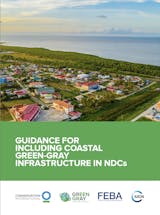
Guidance for Including Green-Gray Infrastructure in NDCs
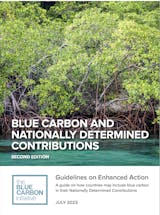
Blue Carbon and Nationally Determined Contributions (Second Edition)
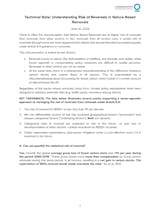
Technical Note: Understanding Risk of Reversals in Nature Based Removals

SB 60 Policy Recommendations (English)

SB 60 Policy Recommendations (Spanish)

SB 60 Policy Recommendations (French)

SB 60 Policy Recommendations (Bahasa Indonesia)
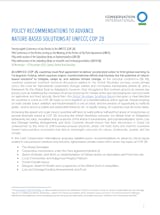
Policy Recommendations to Advance Nature-Based Solutions at UNFCCC COP 28
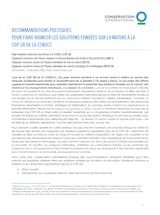
Policy Recommendations to Advance Nature-Based Solutions at UNFCCC COP 28 (French)
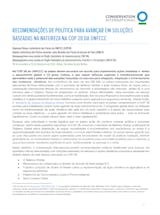
Policy Recommendations to Advance Nature-Based Solutions at UNFCCC COP 28 (Portuguese)
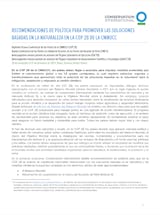
Policy Recommendations to Advance Nature-Based Solutions at UNFCCC COP 28 (Spanish)
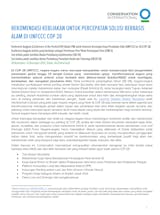
Policy Recommendations to Advance Nature-Based Solutions at UNFCCC COP 28 (Indonesian)
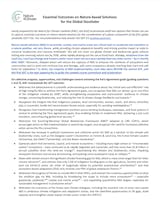
Essential Outcomes on Nature-based Solutions for the Global Stocktake

Technical Note: Understanding Risk of Reversals in Nature Based Removals
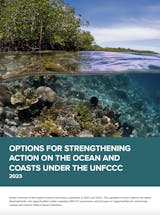
UNFCCC Ocean Climate Options 2023
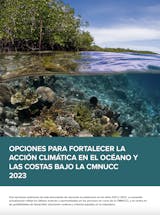
OPCIONES PARA FORTALECER LA ACCIÓN CLIMÁTICA EN EL OCÉANO Y LAS COSTAS BAJO LA CMNUCC 2023
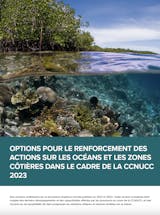
OPTIONS POUR LE RENFORCEMENT DES ACTIONS SUR LES OCÉANS ET LES ZONES CÔTIÈRES DANS LE CADRE DE LA CCNUCC 2023




